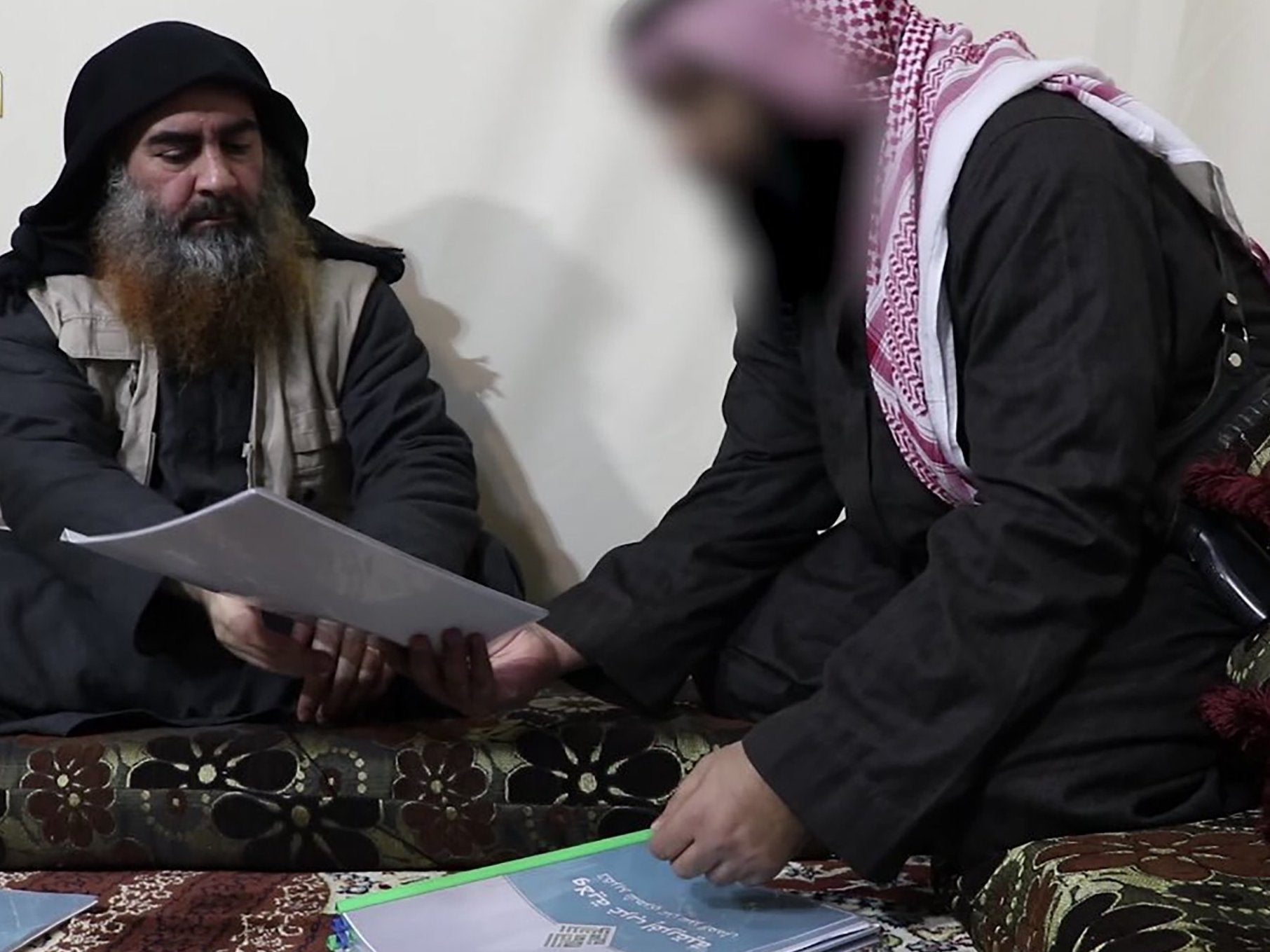US vows to fight Isis’ global ambitions, but the jihadists are adapting
‘We’ve won great victories in the battlefield – now we need to match them with victories in our courtrooms, at our borders, in our banks and online’
At the very end of Abu Baqr al-Baghdadi’s first video appearance in nearly five years, the greying Isis leader is handed folders that bear the names of areas across the world where the jihadi group continues to harbour global visions.
“This battle will have a sequel, God willing,” he said.
There are folders for Isis “wilayat” – meaning provinces – for Somalia, Yemen, the Caucasus, West Africa, Central Africa and Turkey.
The self-declared “caliphate” that once stretched for thousands of miles and ruled over millions of people is gone – but it is clear that Isis’s grand ambitions remain.
The militants have made significant inroads into sub-Saharan Africa and Asia, as seen in the Easter Sunday attacks in Sri Lanka, and are still able to carry out attacks in Afghanistan, Egypt’s Sinai Peninsula, Iraq and Syria.
A top US counterterrorism official this week warned that Isis continues to pose a “dire threat” throughout the world – and said the administration is now looking at how best to next strike the jihadists.
“We’ve won great victories in the battlefield,” said ambassador Nathan A Sales, the US State Department’s top counterterrorism coordinator, during a talk at the Brookings Institution.
“Now we need to match them with victories in our courtrooms, at our borders, in our banks and online.”
He sketched out a dizzying array of operations across the globe carried out by Isis-inspired or like-minded groups – in recent months there have been attacks in Niger, Somalia, the Sinai Peninsula, the Democratic Republic of Congo, Mozambique, the Philippines and Indonesia, as well as Europe.
I get nervous when someone like Baghdadi pops up just before Ramadan
But he warned that the greatest threat was Isis’s Afghanistan branch, the so-called Khorasan wilayat, which controls territory and carries out nearly daily attacks on civilians and military targets.
In moving away from an emphasis on military force to crush Isis, the US wants to restrict efforts to move money through banks and personnel across borders – a policy prescription that fits particularly well with the Trump administration’s hostility to immigration.
“We need to harden our borders to prevent terrorist travels,” said Mr Sales, citing what he claimed were “hundreds” of fighters who’ve made their way back to Europe and southeast Asia after the defeats in the Middle East.

He also reiterated the call on governments around the world to extradite and try their nationals who left to join Isis – a move governments in the UK and Western Europe have been so far reluctant to make for fear of not having enough evidence to prosecute.
“The US calls on all countries to take their citizens back, to take them off the battlefield, and most importantly, to prosecute them,” he said, adding that criminal prosecution “is the most effective way to prevent these fighters from returning to the battlefield”.
Mr Sales said the US has begun a project with Nato and the UN to develop criteria for collecting battlefield evidence to use in court against Isis suspects.
But experts doubt that any US strategy would curtail the rise of jihadist militancy without deep changes across a restless Muslim world dominated by brutal autocrats, including those that crushed the 2011 Arab Spring uprisings and who remain close Washington allies.

“As a military organisation and a proto-state it’s defeated, but as an insurgency it can insert into areas of Sunni dissatisfaction,” one incoming US official told The Independent, speaking on condition of anonymity because he was not authorised to speak to the press.
“The underlying reasons why the Arab uprisings erupted haven’t been resolved, and it’s only a matter of time before some version of Isis emerges.”
Though Mr Sales also spoke of curtailing the funding, travel and online presence of the group, many of their terrorist operations don’t require a lot of money as they utilise operatives already inside the country, and are inspired and planned through communications networks that are close to impossible to shut down.
The Baghdadi video took officials by surprise and left them scrambling to glean clues about his whereabouts.
“Isis is not just a small organisation,” said Adel Abdul Mahdi, Iraq’s prime minister, during a press conference in Berlin.
“It’s widespread and will try to put confidence back in its militants and carry out acts such as those in Sri Lanka.”
Experts also warn that the group is evolving and refining its tactics, with the video suggesting a new phase in the jihadi group’s emphases.
“It illustrated that the concept of wilayat can be physical, virtual or metaphysical,” Theodore Karasik, a researcher at Gulf State Analytics, a Washington-based consultancy, told The Independent.
The Sri Lanka attack even suggested a hint of irony, deploying suicide bombers in the country where Tamil Tiger rebels first perfected such attacks.
The underlying reasons why the Arab uprisings erupted haven’t been resolved
“For Islamic State to do this is a remarkable feat that they pulled off with precision,” he added.
The video emerged soon after the high-profile attack, and just before the Islamic calendar month of Ramadan – a time for religiously motivated sacrifice across the Muslim world.
A recent report by the Institute for the Study of War has warned that Isis has long stepped up attacks during the lunar month, expected to begin around 6 May.
“I get nervous when someone like Baghdadi pops up just before Ramadan,” said Mr Karasik.
“The way he was talking and reviewing [the group’s] structure is a signal to motivate [its followers] ahead of Ramadan. The Islamic calendar plays into Baghdadi’s re-emergence.”
Join our commenting forum
Join thought-provoking conversations, follow other Independent readers and see their replies
Comments
Bookmark popover
Removed from bookmarks